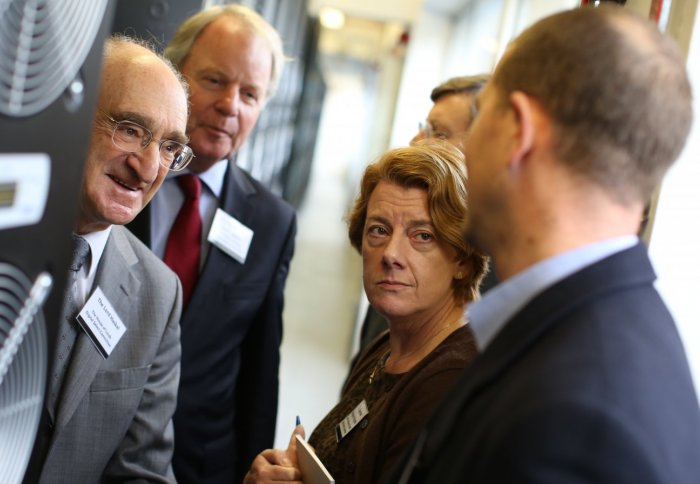Imperial showcases supercomputing capability
by Laura Gates

Committee Chair, Baroness Morgan of Huyton, Lord Haskel, Lord Janvrin and Lord Kirkwood of Kirkhope in the Data Centre
The House of Lords Digital Skills Committee visits Imperial College's High-Performance Computing (HPC) facility.
The House of Lords Digital Skills Committee visited Imperial College’s High-Performance Computing (HPC) facility on Wednesday 19 November 2014 as part of its inquiry into information and communications technology, competitiveness and skills in the UK. Welcomed by Imperial’s Provost Professor James Stirling, the Committee was introduced to College’s supercomputer facility and the economic and social impact of the research and educational development this enables.
Supercomputers and specialised software make it possible to design advanced materials, understand climate change and meet the energy demands of the future. Imperial’s facility has played a crucial part in the awarding of in excess of £100m of research grants from industry and research councils over the last five years, enabling advances in areas from aeronautics to clinical science. Explaining the important role HPC plays in developing advanced digital skills Provost, Professor James Stirling, said: “Students want to come to Imperial College to play their part in finding solutions to global challenges in areas such as energy, the environment and healthcare. Our students learn about the opportunities in harnessing big data, and become skilled programmers in addition to their core discipline. They go on to apply these skills, continuing to influence and innovate in successful careers across the digital economy.”
Imperial’s HPC supports hundreds of professors, senior researchers, PhD and Masters students and is used by research groups and centres including the Grantham Institute for Climate Change, the Thomas Young Centre for Theory and Simulation of Materials, Clinical Sciences Centre, Data Science Institute, Digital City Exchange, Energy Futures Lab, Centre for Nuclear Engineering, London Centre for NanotechnologyCentre for Computational Methods in Science and Engineering. HPC-enabled research across engineering, medicine, physical sciences and business has supported more efficient energy use, developed diagnostics and treatment of rare and common genetic diseases and cancer, designed digitally smarter, more sustainable cities and enhanced aerodynamics for aviation. At Imperial’s Royal British Legion Centre for Blast Injury Studies, a collaboration between military and civilian clinicians, scientists and engineers opened by Prince Harry in October, high performance computing is helping researchers understand mechanisms of brain injury to support diagnosis and treatment of head trauma in blast victims.
Dr. Arash Mostofi’s team of researchers, based in College’s Departments of Materials and Physics, use HPC technology to understand and predict electronic, structural and transport properties of materials used in cutting-edge technologies, including carbon nanotubes, used to create materials with unique strength and conductivity, and polymer membranes that remove salt and minerals from seawater to produce fresh water. Dr. Mostofi said: “Using supercomputers we can apply state-of the-art computational tools to solve problems that lie at the heart of almost every modern technology.”
Senior Lecturer and Associate Director of Imperial’s Centre for Computational Methods in Science and Engineering, Dr Gerard Gorman, teaches students to run simulations to study complex systems and phenomena too expensive, dangerous, or impossible to study by direct experimentation. Today many students not only have to become experts within their own domain of science and engineering, but also become skilled software developers. Dr Gorman said: “Scientific advances made possible through the application of supercomputers and digital skills are driving innovation, investment and economic growth. Imperial’s HPC users contribute to a thriving and rapidly evolving computational field that has become indispensable in modern science and engineering.” Supporting both industry and academia, Imperial and KPMG’s recently launched Business Analytics Institute helps British businesses use data to solve complex issues, training over 800 PhD students to become data scientists. Continuing to build supercomputer user skills, the HPC team within the Information & Communication Technologies department is expanding training in the use of computational tools for postgraduate students across Imperial’s new Centres for Doctoral Training.
To grow the capability of this valuable research and teaching supercomputing resource, Imperial College has committed annual capital investments of £2m for the next five years in HPC hardware at the frontline of processing capacity, in addition to funding for support, running costs and training in state-of-the-art computational techniques. The vision for the resulting substantial expansion of Imperial’s supercomputing facilities is to achieve a Tier 2 capability, normally considered a regional scale at one level above what is expected of local institutional facilities. Such a facility will also ensure that Imperial’s researchers can make best use of Tier 1 national facilities such as ARCHER.
The Digital Skills Committee is expected to publish its report by March 2015. To find out more about the College’s supercomputing capability, the HPC website offers information and support for staff and student researchers.
Article text (excluding photos or graphics) © Imperial College London.
Photos and graphics subject to third party copyright used with permission or © Imperial College London.
Reporter
Laura Gates
Information & Communication Technologies